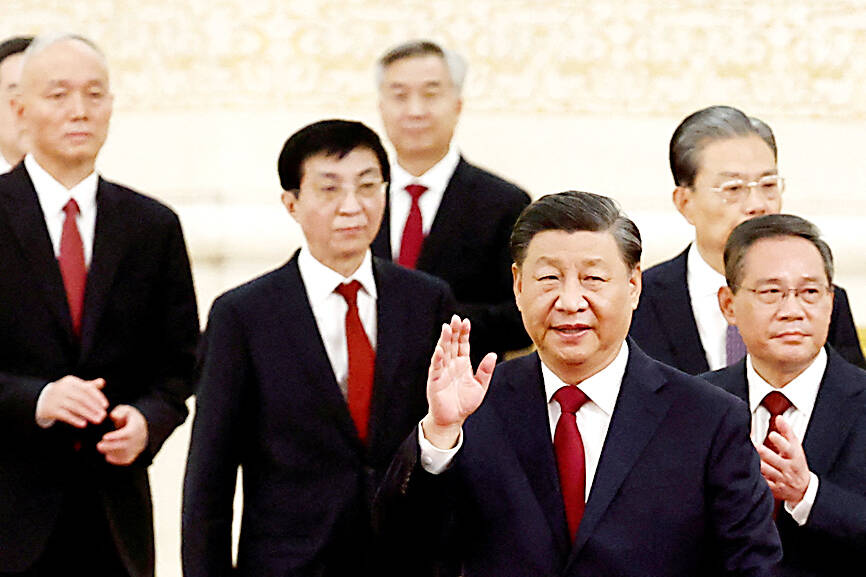Beijing has stopped keeping a regular schedule for convening two of its most important decisionmaking bodies in a change highlighting the increasing unpredictability of Chinese President Xi Jinping’s (習近平) rule, an official familiar with the matter said.
Xi’s fickle governance could spark unrest in China, which increases the risk of war for Taiwan, the official said earlier this week on condition of anonymity.
The Central Comprehensively Deepening Reforms Commission (CCDR), a group Xi personally controls, has steered China’s social and economic policy since its founding in 2013 by the third Plenary Session of the 18th Central Committee of the Chinese Communist Party, he said.

Photo: Reuters
For nearly a decade, this body regularly held meetings every two months, but the pattern was broken with its meeting in September last year, which was not followed by another one until late April this year, he said.
After that, the group held its most recent meeting on July 11, showing that the scheduling of commission meetings has lost all rhyme or reason, he said.
The CCP’s Politburo, nominally a superior agency to the CCDR, was not immune to this trend and increasingly convened at irregular times following Xi’s ascension to the presidency for life, he said.
Consisting of a standing committee of seven people and 17 other members in various subordinate commissions, the Politburo exercises authority in matters concerning Chinese politics, macroeconomics and the top appointments, he said.
By tradition, the Politburo convenes once a month to perform its functions, but this is no longer true, which hints at the decline of the institutions and the arbitrary nature of Xi’s reign, he said.
Xi seems to convene the Politburo at whim as his personal authority increasingly superseded the party’s institutionalized decisionmaking processes, he said.
These developments will have far-reaching consequences for China, as foreign firms are likely to balk at the risks of doing business in a volatile and unpredictable state, the official said, adding that Taiwanese investors are becoming pessimistic about the market.
Xi’s erratic decisionmaking, efforts to build a digital totalitarian state and an economy increasingly hobbled by foreign capital flight significantly increase the risks of domestic instability, the official said.
As Beijing could resort to war to divert public attention from an internal crisis, Taiwan should do everything possible to boost its defense, he said.

Taiwan has received more than US$70 million in royalties as of the end of last year from developing the F-16V jet as countries worldwide purchase or upgrade to this popular model, government and military officials said on Saturday. Taiwan funded the development of the F-16V jet and ended up the sole investor as other countries withdrew from the program. Now the F-16V is increasingly popular and countries must pay Taiwan a percentage in royalties when they purchase new F-16V aircraft or upgrade older F-16 models. The next five years are expected to be the peak for these royalties, with Taiwan potentially earning

STAY IN YOUR LANE: As the US and Israel attack Iran, the ministry has warned China not to overstep by including Taiwanese citizens in its evacuation orders The Ministry of Foreign Affairs (MOFA) yesterday rebuked a statement by China’s embassy in Israel that it would evacuate Taiwanese holders of Chinese travel documents from Israel amid the latter’s escalating conflict with Iran. Tensions have risen across the Middle East in the wake of US and Israeli airstrikes on Iran beginning Saturday. China subsequently issued an evacuation notice for its citizens. In a news release, the Chinese embassy in Israel said holders of “Taiwan compatriot permits (台胞證)” issued to Taiwanese nationals by Chinese authorities for travel to China — could register for evacuation to Egypt. In Taipei, the ministry yesterday said Taiwan

Taiwan is awaiting official notification from the US regarding the status of the Agreement on Reciprocal Trade (ART) after the US Supreme Court ruled US President Donald Trump's global tariffs unconstitutional. Speaking to reporters before a legislative hearing today, Premier Cho Jung-tai (卓榮泰) said that Taiwan's negotiation team remains focused on ensuring that the bilateral trade deal remains intact despite the legal challenge to Trump's tariff policy. "The US has pledged to notify its trade partners once the subsequent administrative and legal processes are finalized, and that certainly includes Taiwan," Cho said when asked about opposition parties’ doubts that the ART was

If China chose to invade Taiwan tomorrow, it would only have to sever three undersea fiber-optic cable clusters to cause a data blackout, Jason Hsu (許毓仁), a senior fellow at the Hudson Institute and former Chinese Nationalist Party (KMT) legislator, told a US security panel yesterday. In a Taiwan contingency, cable disruption would be one of the earliest preinvasion actions and the signal that escalation had begun, he said, adding that Taiwan’s current cable repair capabilities are insufficient. The US-China Economic and Security Review Commission (USCC) yesterday held a hearing on US-China Competition Under the Sea, with Hsu speaking on